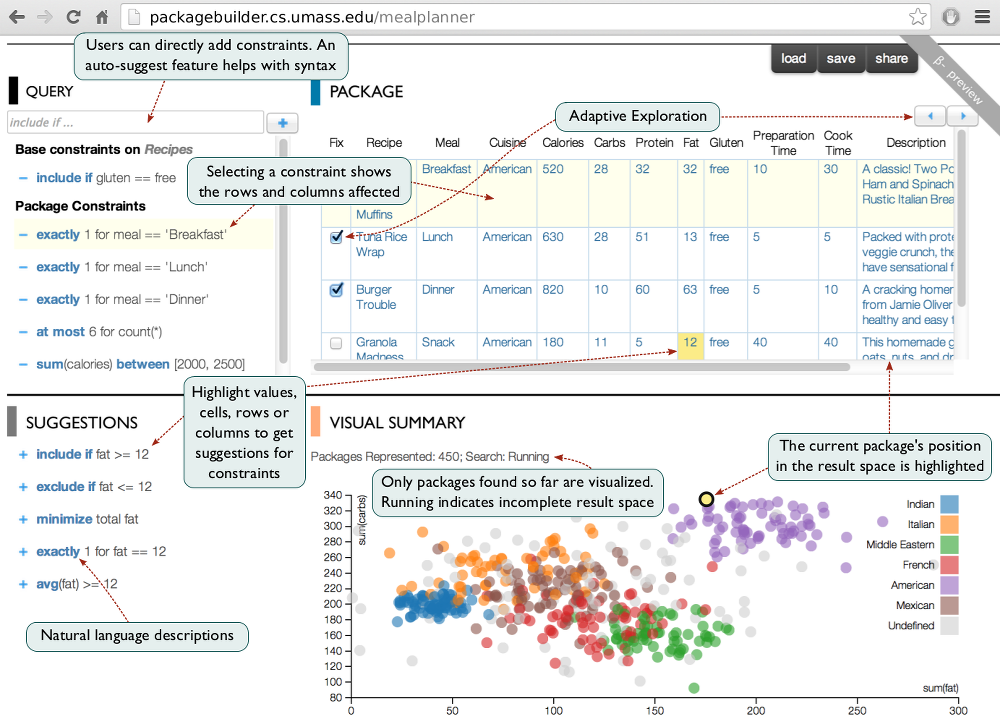Package Builder is a system that extends query engines to support package generation. A package is a collection of tuples with certain global properties defined on the collection as a whole.
Examples
- Meal Planner:
An athlete needs to put together a dietary plan in preparation for a race. She wants a high-protein set of three meals for the day, that are between 2000 and 2500 calories in total. All meals should be gluten-free. It is easy to exclude meals that include gluten, as this condition can be checked for each meal (tuple) individually with a regular selection predicate. Other constraints need to be verified collectively over the entire package.
- Investment Portfolio:
A broker wants to construct an investment portfolio for one of her clients. The client has a budget of $50K, wants to invest at least 30% of the assets in technology, and wants a balance of short-term and long-term options. The broker cannot select each stock option individually, but rather needs to find a stock package that satisfies all these constraints collectively.
VLDB 2020 Talk : Best Demonstration Award
Don't existing DBMSs support package queries already?
With existing query languages, users can easily express base constraints, i.e., constraints that apply to every tuple in the query result. Global constraints are properties that a set of tuples satisfy as a whole. Unfortunately, these types of constraints are largely disregarded by traditional DBMSs and their query languages. Therefore, supporting them is a burden on the application level, rather than, as it should, on the database level.
PaQL — The Package Query Language
Meal Planner example:
SELECT PACKAGE(✱) AS MealPlan
FROM Recipes R REPEAT 0
WHERE R.gluten-free = 'TRUE'
SUCH THAT
COUNT(*) = 3 AND
SUM(calories) BETWEEN 2000 AND 2500 AND
(SELECT COUNT(*) FROM MealPlan WHERE carbs > 0) >= COUNT(*)/2
MAXIMIZE SUM(protein)
sPaQL — The Stochastic Package Query Language
We must often make decisions in the face of uncertain data. Probabilistic databases excel at modeling and managing uncertainty. We offer stochastic optimization within a probabilistic database, close to the data.
Portfolio Optimization example:
SELECT PACKAGE(✱) AS Portfolio
FROM Stock_Investments R REPEAT 5
SUCH THAT
SUM(price) <= 1000 AND
SUM(Gain) <= -10 WITH PROBABILITY <= 0.05
MAXIMIZE EXPECTED SUM(Gain)
Interface Abstractions
Packages queries are more complex, semantically and algorithmically, compared to traditional database queries, and they pose challenges on several fronts. They can have complex specifications and they are hard to process by users given the large volume of results. Our package template abstraction encodes package specifications in a familiar tabular format. The system presents result packages to users in a way that allows them to meaningfully view the entire package space. Furthermore, PackageBuilder allows users to easily navigate the package space and to instruct the system about which constraints should be taken into account.
Here's a screenshot example of our package template abstraction (click on it to download the full-sized version):
Universities
-
College of Information and Computer Sciences, University of Massachusetts Amherst, USA

-
Computer Science, New York University Abu Dhabi, UAE

People
- Faculty
- Lead Student Researcher
- sPaQLTools Interface
- Incremental Package Query Support
- Ahmad Chatha

- Zhiru Zhu

- Merritt B. Kowaleski
- Ahmad Chatha
- Past students and collaborators
- Nishant Yadav

- Nishad Ranade

- Kyaw Htet

- Juan Felipe Beltran

- Kevin Fernandes

- Rahul Ramakrishna

- Nishant Yadav
Publications
-
sPaQLTooLs: A Stochastic Package Query Interface for Scalable Constrained Optimization
 Demo Paper
@ VLDB 2020
Demo Paper
@ VLDB 2020
Best Demonstration Award at VDLB 2020 -
Stochastic Package Queries in Probabilistic Databases
 Paper
@ SIGMOD 2020
Paper
@ SIGMOD 2020
-
Scalable Computation of High-Order Optimization Queries
Communications of the ACM (CACM) 2019
CACM Research Highlight -
Package queries: efficient and scalable computation of high-order constraints
 Pre-print
@
The VLDB Journal 2018, Special Issue on Best Papers of VDLB 2016
Pre-print
@
The VLDB Journal 2018, Special Issue on Best Papers of VDLB 2016
-
A Scalable Execution Engine for Package Queries
 Paper
@ SIGMOD
Record 2017
Paper
@ SIGMOD
Record 2017
ACM SIGMOD Research Highlight Award: Award website -
Scalable Package Queries in Relational Database Systems
 Paper
@ VLDB 2016,
Paper
@ VLDB 2016,
 Paper (Extended Version on
arXiv),
Paper (Extended Version on
arXiv),
 Poster,
Poster,
 Slides
Slides
Best papers of VDLB 2016 -
Improving Package Recommendations through Query Relaxation
 Workshop
Paper @ Data4U 2014 in
conjunction with VLDB 2014,
Workshop
Paper @ Data4U 2014 in
conjunction with VLDB 2014,
 Slides
Slides
-
PackageBuilder: From Tuples To Packages
 Demo Paper
@ VLDB 2014,
Demo Paper
@ VLDB 2014,
 Poster
@ VLDB 2014,
Poster
@ VLDB 2014,
 Challenge Poster
@ VLDB 2014,
Challenge Poster
@ VLDB 2014,
 Poster
@ NEDB 2014,
Poster
@ NEDB 2014,
 Technical Report
Technical Report
-
PackageBuilder: Querying for packages of tuples
 Undergraduate Research Poster @ SIGMOD 2014
Undergraduate Research Poster @ SIGMOD 2014
